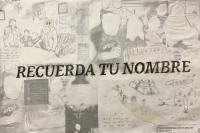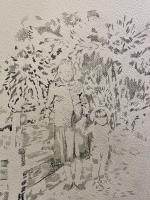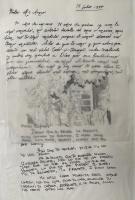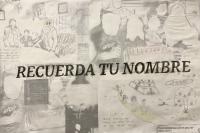Aquetzali (Kiki) Serna is a Mexican visual artist living and working in Kansas, MO. Once undocumented, now part of the DACA program, Kiki craves healing, catharsis and a voice through her creative art practice. Her pieces develop from her inner feelings of alienation, confusion and fragmentation as an immigrant. Serna’s artwork will be on display at the Cedar Roe branch until December 21, 2023.
What comes first – the medium or the message? Tell me a little about the work that will be on view.
The message tends to be part of the medium in my artwork and my art practice. My practice is usually attached to materials that help convey the ideas behind my artwork. For example, I tend to gravitate towards the use of vellum. Vellum is a medium that conveys foggy, past and fragmented memories for me. The artwork that will be on view is a visual narrative of the immigrant experience through my story. This body of work will also depict family, memory, the feeling of missing someone and the layering facets of a collective family story.
What did you have to develop, try or learn to create this artwork?
To create this artwork I had to re-learn a lot of autobiographical content and my family's story. Through this I was able to develop the imagery that I'm using in my work. A lot of my practice has to deal with un-earthing and peeling back layers of family stories, memories, thoughts and shared experiences.
What’s the most challenging thing about your creative process?
The most challenging part of my creative process is the research phase. Most of my research comes from our families' shared knowledge of ourselves, due to this there's a lot of sitting, talking, and looking through documents. This personal research often relies on using archives objects, documents - videos, audio, photographs, archived by my family. I have to spend a lot of time with each piece, reading through it, looking at it, and writing as a way to unpack everything. The research phase is quiet work, but it takes a lot of mental, emotional and physical time.
How does your work comment on current social or political issues?
I think my work is already a response to the immigrant experience in the United States and to cultural experiences in the POC landscape of the Midwest. Just by existing my story becomes part of the larger shared experiences within these topics. So, by furthermore being intentional, spending time researching, documenting, archiving and making something out of all these steps, I'm able to add to these conversations.
What is your most important artist tool? Is there something you can’t live without in your studio?
Archived family items and my scanner.
What books, movies and/or music have inspired you recently?
I've recently jumped back into reading Maxine Hong Kingston's The Woman Warrior. This book is very special to me, and I tend to use it as a tool to transition into new artwork, a tool to help me meditate on things.
Movie/show wise I finished watching Beef on Netflix. I completely enjoyed watching this show and was on the edge of my seat the whole time. I was also left thinking about millennial rage and untreated trauma, something I'm interested in tapping into in my work in the near future.




